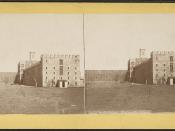The relationship between employer and employees is a rather vague one. In most cases, the employer tends to treat his employees with an abrupt relationship. That is, not having the time to yield or discuss their physical needs and emotions. In addition, the employer tends to form a rather distant and callous relationship with his employees. The only consideration of the employer is that his employees solely exist to benefit the company, and to make it more successful and prosperous. In other cases, the employer tends to be lenient towards his employees. He has a tendency to care about their physical and emotional needs. In Herman Melville's short story, Bartleby the Scrivener, the relationship between employer and employees is a rather compassionate one. The employer, who is also the narrator, has a tendency to show a great deal of over-leniency and sympathy towards the character of Turkey, Nippers, and Bartleby.
Although Turkey is considered a valuable copyist in the morning, he proves to be very inefficient in the afternoon. According to the narrator, "not only would he be reckless and sadly given to making blots in the afternoon, but some days he went further and was rather noisy"� (Melville 95). In addition to his behavior in the afternoon: He made an unpleasant racket with his chair; spilled his sandbox; in mending his pens, impatiently split them all to pieces and threw them on the floor in a sudden passion; stood up and learned over his table, boxing his papers about in a most indecorous manner, very sad to behold in an elderly man like him. (95) Turkey's behavior in the afternoon was primarily due to the fact that he spent most of his money on liquor. As a result, in the afternoon, he was considered to be drunk...


